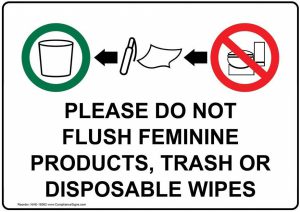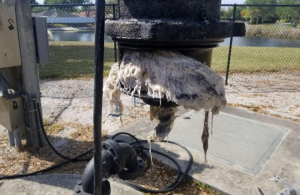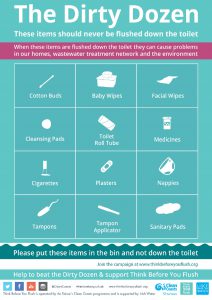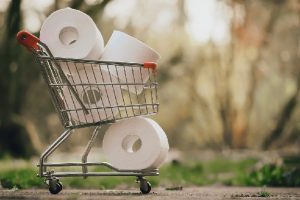Let’s talk about our toilets…and, more specifically, what we can flush down them.

Though the list is short, here is what is appropriate to flush down your toilet:
- Urine
- Feces
- Toilet paper
Anything outside of this list has the potential to clog up the city’s pipes and cause overflow.
What Causes Overflow?

Wipes, even if they are labeled “flushable,” should never be flushed down your toilet. They cannot be broken down or dispersed and have a tendency to stick together.
These clogs can cause sewage spills that pop manhole covers, disrupt equipment at pump stations, and damage sewer lines. Not only do these clogs inhibit our ability to process sewage, but your waste can end up in local water bodies. Over 80% of ocean pollution comes from land-based sources, including septic systems. In fact, Miami-Dade County has very recently experienced problems with wipes and other non-flushables in its wastewater. A combination of heavy rain and pollution has caused overflow, leading to 10,000 gallons of wastewater entering the mangroves next to its North District Wastewater Treatment Plant. The county issued a no swim advisory around the nearby Oleta River Park. Officials are also discouraging recreational fishing and other outdoor activities in the area. Wipes are not the only offenders in this sad and relevant issue.

Here is a list of what NOT to flush down your toilet.
- Cotton swabs
- Baby wipes
- Facial wipes
- Cleansing pads
- Toilet paper tubes
- Medicine
- Cigarette butts
- Anything plastic
- Diapers
- Tampons and sanitary pads
- Paper towels
Although this list is not exhaustive, it includes some common household items that cause trouble. If you want to learn more about what makes these items harmful, check out the Think Before You Flush campaign.
Keeping Yourself AND the Environment Clean!

One, do your best to keep toilet paper stocked. Stores are starting to increase their supply, so it should be available more regularly.
Two, keep a wastebasket handy for disposing of any wipes you do end up using.
Three, water also does a great job of cleaning! Don’t be afraid to wash up using a more sustainable resource.
Four, spread the word, not your waste! Let your neighbors know what behavior is and isn’t appropriate for the bathroom.
By working together, we can keep these harmful products from clogging our sewage and polluting local water bodies. Stay safe, be well, and remember to limit what you flush!
For more information on what’s happening in our county’s sewers, you can read this recent article from the Herald-Tribune.
An Equal Opportunity Institution. UF/IFAS Extension, University of Florida, Institute of Food and Agricultural Sciences, Nick T. Place, dean for UF/IFAS Extension. Single copies of UF/IFAS Extension publications (excluding 4-H and youth publications) are available free to Florida residents from county UF/IFAS Extension offices. Sarasota County prohibits discrimination in all services, programs or activities. View the complete policy at www.scgov.net/ADA.
 0
0
